Organic Mushroom Chitosan
Source: organic oyster mushroom (Pleurotus ostreatus)
More benefits for sustainability, health, marketability, and eco-friendly
Organic Mushroom Chitosan
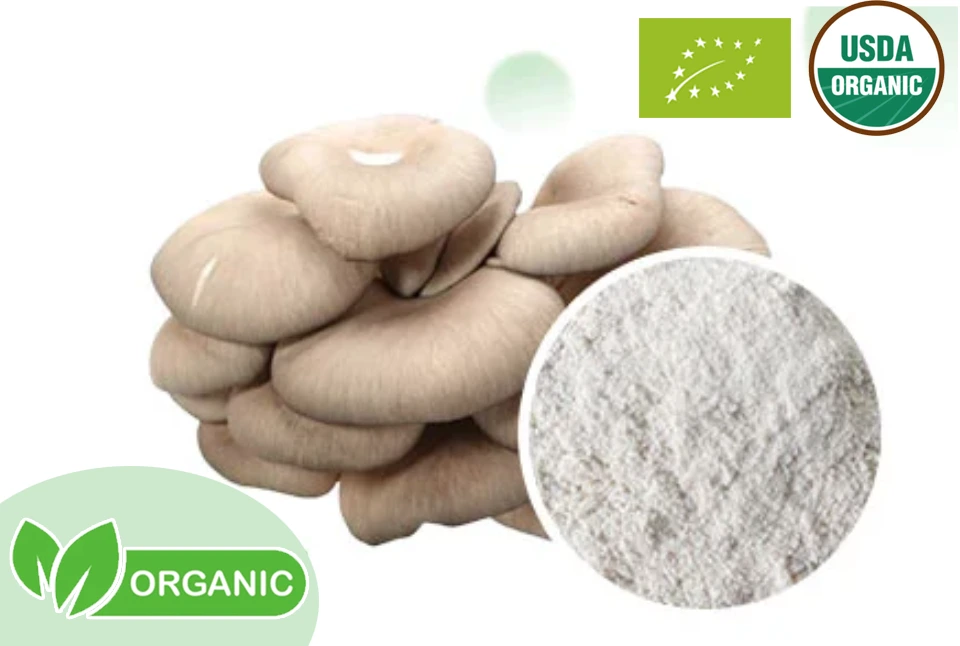
Organic mushroom chitosan is a natural biopolymer derived from the cell walls of certain mushrooms, such as oyster mushrooms (Pleurotus ostreatus).
Chitosan is obtained through a process of deacetylation of chitin, a natural polysaccharide found in the cell walls of fungi like mushrooms, which makes it a suitable option for individuals with shellfish allergies and those seeking vegan or vegetarian alternatives.
Acid-soluble
Viscosity: 20-1000 cps
Water-soluble
Viscosity: around 20 cps
Water-soluble
Molecular weight: NMT 5kDa
Water-soluble
Viscosity: 20-80 cps
N,O-CMS
Advantages & Benefits
GMO-free
Allergen-free
Gluten-free
Toxicity-free
Curelty-free
Irradiation-free
Biodegradable
Biocompatible
Renewable
Food Grade
Antimicrobial & Antibacterial
Antioxidant
100% Plant-based
Vegan
Environmental Friendly
More Benefits of Organic Mushroom Chitosan
The primary difference between organic mushroom chitosan and regular mushroom chitosan lies in the cultivation and production processes, particularly regarding the adherence to organic farming standards.
Organic mushroom chitosan offers benefits in terms of sustainability, environmental impact, and potential health considerations, making it an attractive option for consumers seeking high-quality, eco-friendly products.
1. Cultivation Standards
Organic mushrooms are grown without the use of synthetic pesticides, herbicides, fertilizers, or genetically modified organisms (GMOs).
The cultivation process must comply with organic farming regulations, which emphasize sustainability, biodiversity, and soil health.

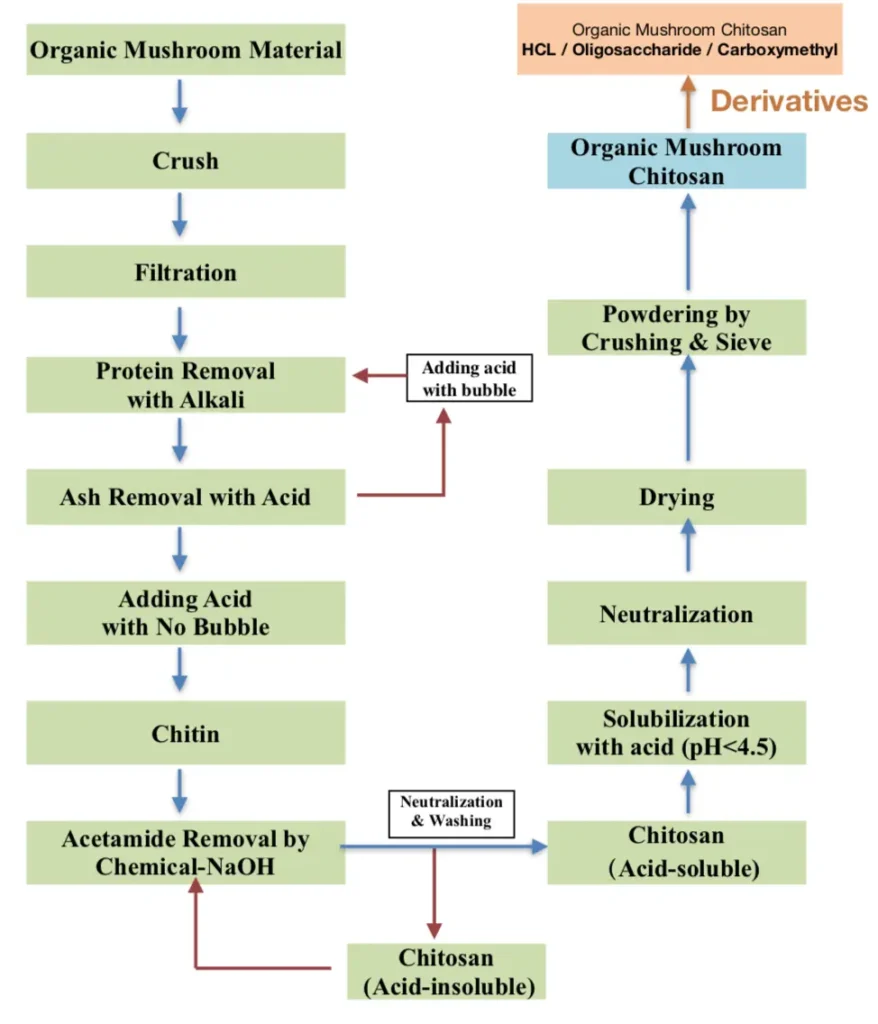
2. Processing
The extraction and processing of chitosan from organic mushrooms must also adhere to organic guidelines. This includes using non-toxic, environmentally friendly methods and avoiding the use of synthetic chemicals in the extraction process.
3. Environmental Impact
Organic production methods aim to minimize environmental impact, promote soil and water conservation, and reduce carbon footprint, making organic mushroom chitosan a more sustainable choice.
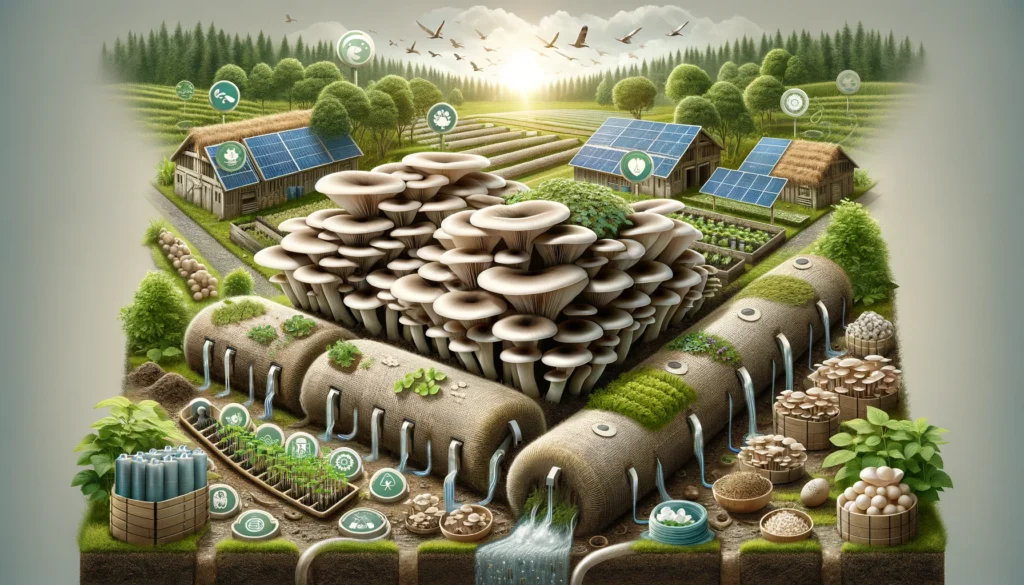
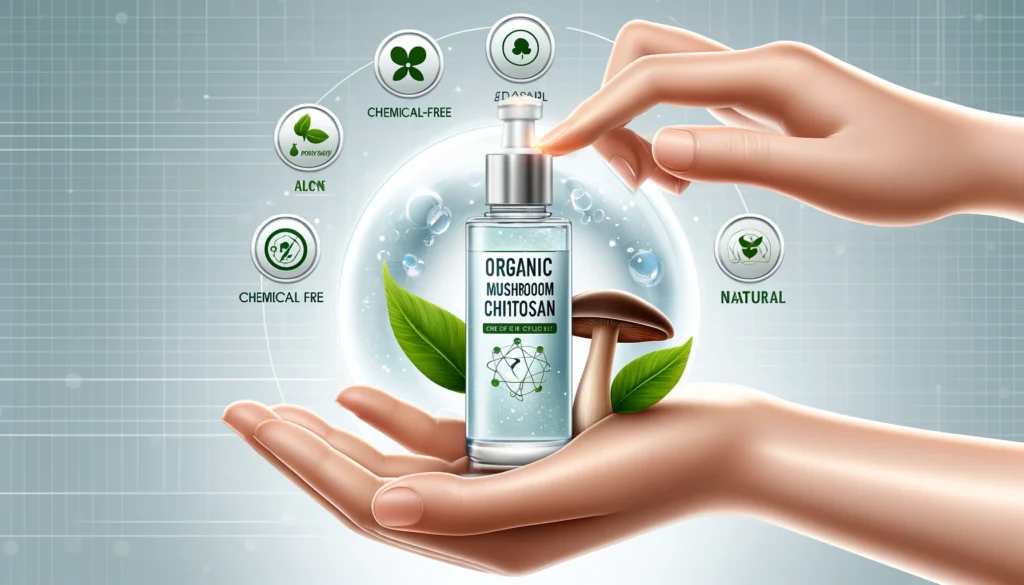
4. Health and Safety
Organic chitosan is free from residues of synthetic chemicals, which may be important for consumers concerned about potential health risks associated with conventional farming practices.
Applications of Organic Mushroom Chitosan
Effective for Over 23 Applications with Positive Feedback
Applications Benefits of Organic Mushroom Chitosan
The applications of organic mushroom chitosan are largely the same as those of regular mushroom chitosan, given that both types share similar chemical properties and functionalities.
However, organic mushroom chitosan offers additional advantages in terms of consumer trust and market appeal due to its organic certification and associated benefits related to sustainability, health, and marketability.

Health-Conscious Consumers
Products containing organic mushroom chitosan may be more attractive to consumers who prioritize organic and natural ingredients in their purchases.

Eco-Friendly Products
Organic mushroom chitosan aligns with the growing demand for sustainable and environmentally friendly products, appealing to environmentally conscious consumers.
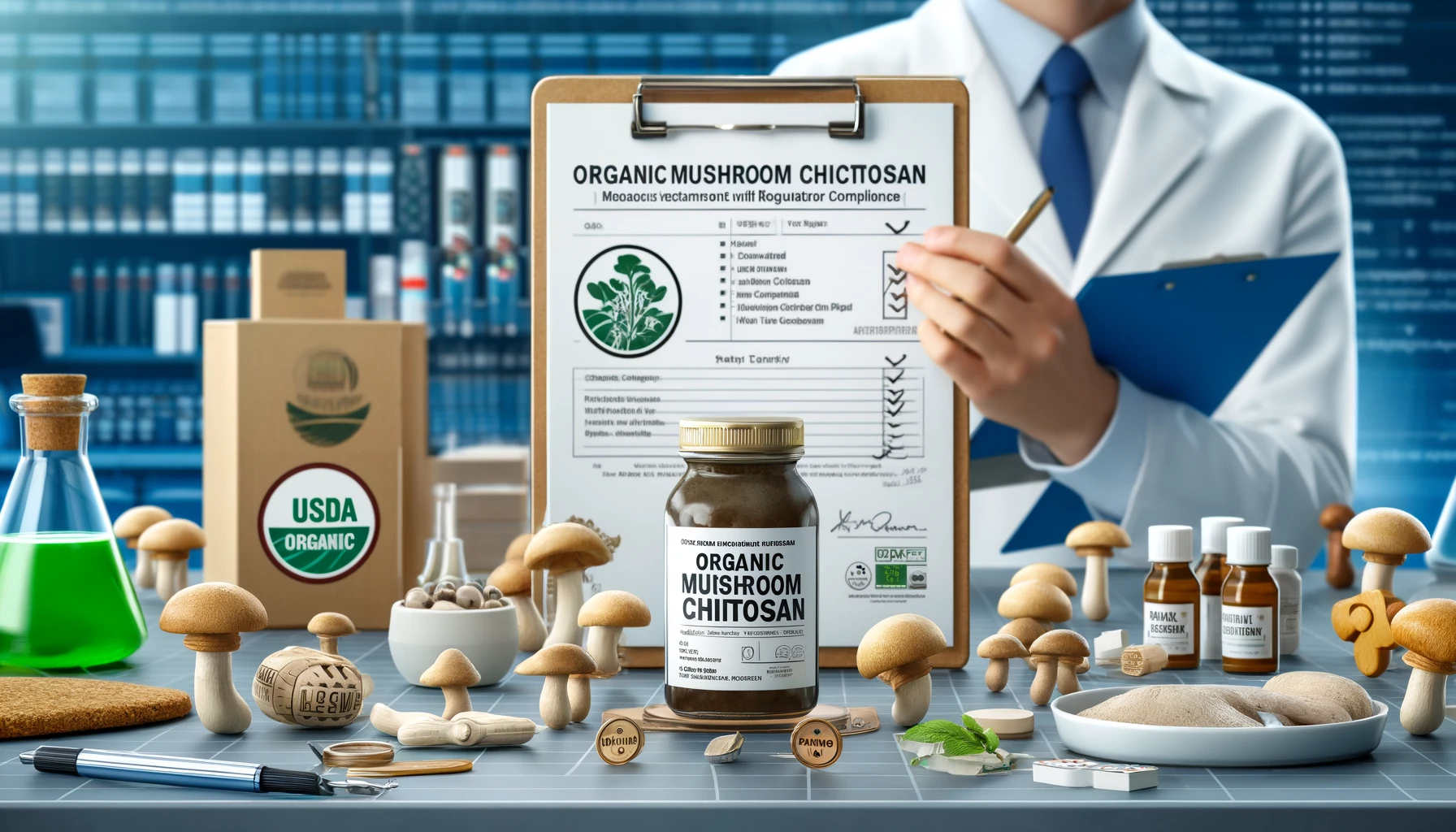
Regulatory Compliance
Organic certification can facilitate compliance with regulations and standards in markets that require or prefer organic ingredients.
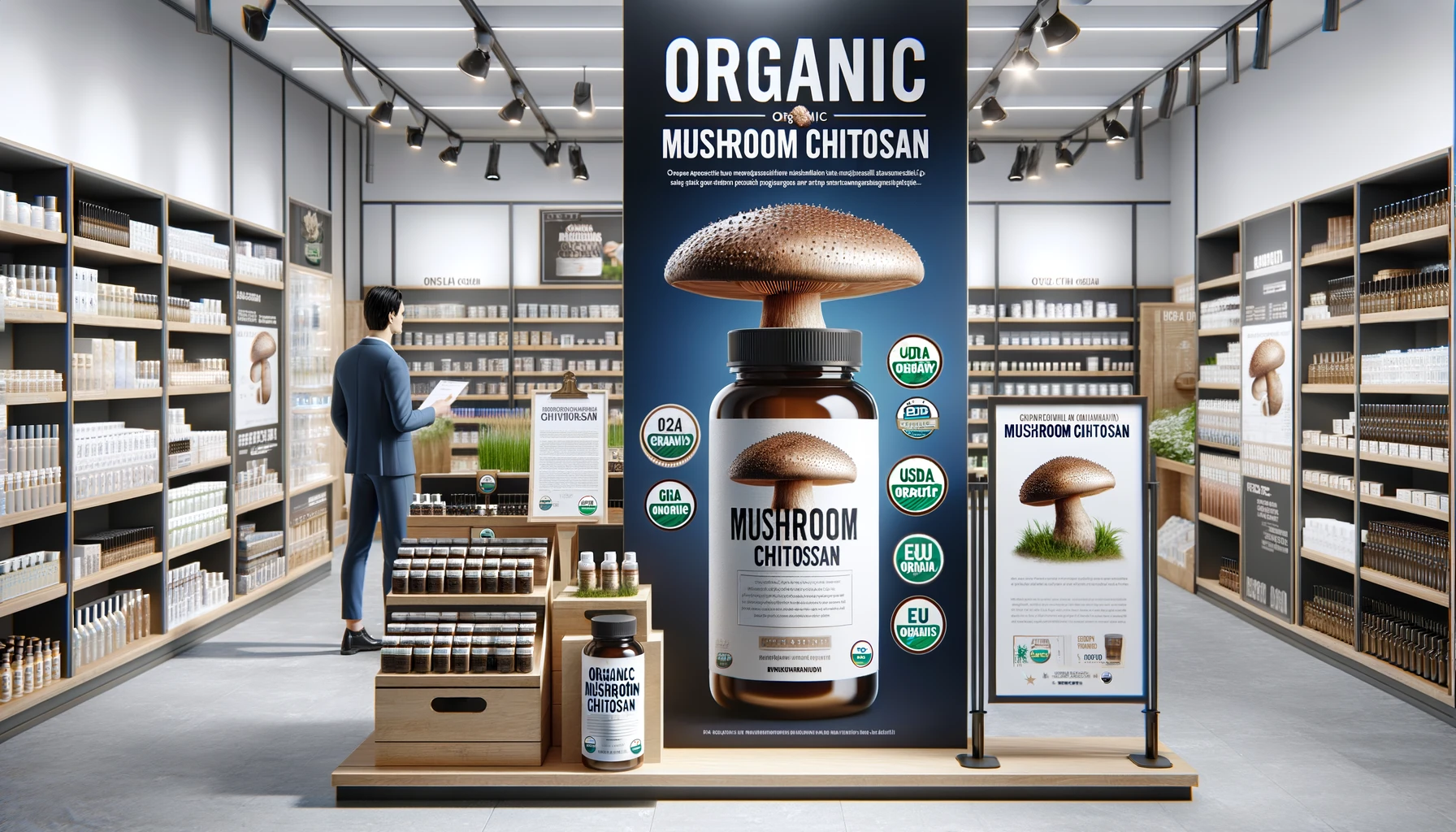
Marketing Advantage
Brands can leverage the organic certification of chitosan to differentiate their products and create a unique selling proposition.
Specification Sheet of Organic Mushroom Chitosan
This is the specification of Organic Mushroom Chitosan (Acid-soluble) for your reference.
We offer various types of organic mushroom chitosan, including acid-soluble, water-soluble: hydrochloride, oligosaccharides, and carboxymethyl chitosan.
Please contact us for more information and specific inquiries.
| ANALYSIS | SPECIFICATION |
|---|---|
| Appearance | Off-white to light yellow powder |
| Odor and Taste | Characteristics |
| Deacetylation Degree | NLT 98% |
| pH value | 7.0-8.0 |
| Viscosity (1% in 1% acetic acid) | 20-1000 cps (mPa.s) |
| Particle size | NLT 98% pass 80 mesh |
| Loss on drying | NMT 8.0% |
| Ash | NMT 2.0% |
|
Heavy Metals As Pb Cd Hg Sum |
NMT 2.0 ppm NMT 1.0 ppm NMT 0.5 ppm NMT 0.5 ppm NMT 20.0 ppm |
|
Microbiological quality Total plate count Yeast & mold E. coli Salmonella |
NMT 1000 cfu/g NMT 100 cfu/g Negative Negative |
Organic Certificates
Our organic mushroom chitosan is audited and certified in accordance with the certification scheme recognized as equivalent to the provisions of Regulation (EC) No 834/2007. It is also audited and certified under the USDA organic regulations, 7 CFR Part 205, and Canada Organic Regime (COR).
(COR equivalent products are certified in accordance with the terms of the U.S.–Canada Organic Equivalency Arrangement.)

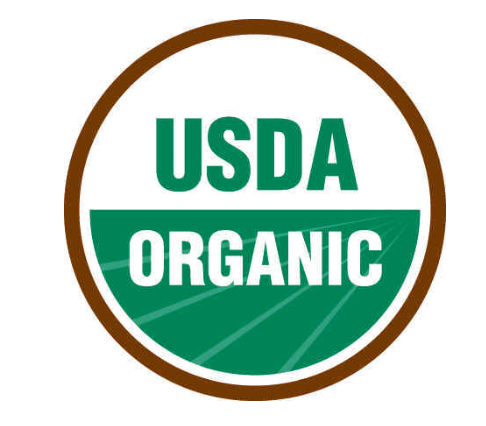
Get in Touch with Us!

- Get Free Sample
- Get Step Quote
- 24/7 Service
- Customized Specification
- Confidentiality Agreement
